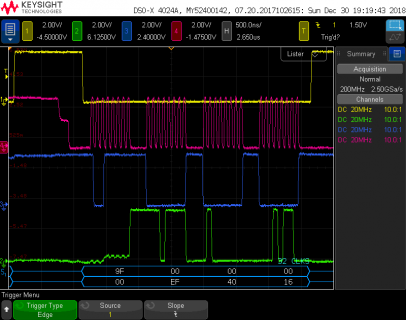defragster
Senior Member+
I'm okay with F_CPU_ACTUAL evolving as needed. #defines versus things the linker may or may not find is painful when trying to compare and contrast T4 and another Teensy on same sketch.
> If anything the T4 needs added will NOP out in the end, getting the Teensy3 tree to compile is why I mentioned it. Like :: set_arm_clock(), F_CPU_ACTUAL. If not then we can #ifdef that in sketches.
Given my play time with CycleCounter I tried that and found it stalls as noted with PULL request, which stops delayMicroseconds() running as noted. I'm not sure if that suggests that usb_pll_start() may affect any other prior work?
Also noted that any USB print before Serial==TRUE halts the Teensy - you made note it was iffy - not sure if that is new info - until then "while ( !Serial && millis() < 4000 ) ;" works to get output as noted.
FYI - using CycleCounter at 600 MHz lasts just over 7.15 seconds before wrapping so I'm not sure if that is a caveat desired for using in elapsedMicros? Same for delayMicroseconds() is probably fine?
Also FYI expected/future note my test sketches seem to be okay at default optimize FASTER, and a change there also seems fail to start after upload in some combination.
> If anything the T4 needs added will NOP out in the end, getting the Teensy3 tree to compile is why I mentioned it. Like :: set_arm_clock(), F_CPU_ACTUAL. If not then we can #ifdef that in sketches.
Given my play time with CycleCounter I tried that and found it stalls as noted with PULL request, which stops delayMicroseconds() running as noted. I'm not sure if that suggests that usb_pll_start() may affect any other prior work?
Also noted that any USB print before Serial==TRUE halts the Teensy - you made note it was iffy - not sure if that is new info - until then "while ( !Serial && millis() < 4000 ) ;" works to get output as noted.
FYI - using CycleCounter at 600 MHz lasts just over 7.15 seconds before wrapping so I'm not sure if that is a caveat desired for using in elapsedMicros? Same for delayMicroseconds() is probably fine?
Also FYI expected/future note my test sketches seem to be okay at default optimize FASTER, and a change there also seems fail to start after upload in some combination.


